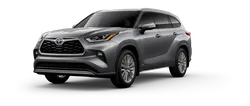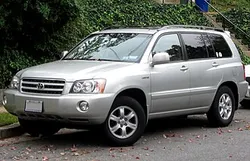

Toyota Highlander Generation 1 - U20 Overview
Explore the Toyota Highlander Generation 1 (U20) features, specifications, and history. Discover why this model continues to be a favorite among car enthusiasts in Portugal.
The Toyota Highlander, also known as the Toyota Kluger in some markets, has earned its status as a reliable midsize SUV since its introduction in 2000. The first generation, designated as U20, made its debut...
Technical Specifications
Select Version
Dimensions
Engine
Driving
Others
History and Features
Mycarro AI
Apr 27, 2025
The Toyota Highlander, also known as the Toyota Kluger in some markets, has earned its status as a reliable midsize SUV since its introduction in 2000. The first generation, designated as U20, made its debut at a time when the demand for such vehicles was rapidly increasing. Toyota recognized the potential for a versatile SUV that could accommodate families while delivering an enjoyable driving experience. This article delves into the features, specifications, and impact of the first-generation Highlander.
Overview and Design
The first-generation Toyota Highlander was produced from 2001 to 2007. It was built on Toyota's Camry platform, though significantly larger, allowing for enhanced interior space. The Highlander adopted a contemporary and appealing design that combined spaciousness with a refined appearance. Its sleek lines and aerodynamic shape not only contributed to its aesthetic value but also improved fuel efficiency, a notable advantage during its production years.
With a length of approximately 184 inches and a width of 75 inches, the Highlander offered plenty of room for passengers and cargo alike. Its interior configuration was flexible, featuring a standard five-passenger seating arrangement, with the option for a third row that could expand capacity to seven. This versatility made it a Practical choice for families or those who required additional cargo space.
Engine and Performance
During its production run, the first-generation Highlander was equipped with two primary engine options: a 2.4-liter inline-four and a 3.3-liter V6 engine. The four-cylinder engine was capable of producing 155 horsepower, while the V6 upped the ante with 230 horsepower, making it a popular choice among consumers. The V6 engine provided superior performance, especially when towing, which was an essential consideration for many SUV buyers at the time.
Both engines were paired with either a five-speed manual or a five-speed automatic transmission. The Highlander also offered an all-wheel-drive system, enhancing its capability in various driving conditions, such as rain or snow. This combination of power and utility made it appealing for those seeking a family-oriented vehicle that could also handle adventures off the beaten path.
Interior Features and Comfort
Inside the Highlander, comfort and convenience were prioritized. The cabin was designed with quality materials, while its layout emphasized user-friendly features. Standard equipment included air conditioning, a CD player, and power windows and locks. Higher trims provided additional luxuries such as leather seats, sunroofs, and advanced audio systems.
Notably, the Highlander also put a strong focus on safety. It came equipped with features such as front airbags, antilock brakes, and traction control systems. These safety measures have contributed to the Highlander's positive reputation among family-oriented SUV buyers, reinforcing Toyota's dedication to providing secure vehicles.
Market Impact and Reception
Upon its release, the first-generation Toyota Highlander received generally favorable reviews from customers and auto enthusiasts. It quickly established itself as a strong contender in the midsize SUV category, competing with other models such as the Honda Pilot and Ford Explorer. Its combination of reliability, comfort, and performance earned it accolades, further solidifying Toyota's reputation as a manufacturer of dependable vehicles.
Consumer reports noted how the Highlander appealed not just to families, but also to individuals looking for a spacious vehicle for everyday commuting. Its practicality, coupled with Toyota's long-standing reliability, led to strong sales throughout its production years.
Conclusion
The Toyota Highlander Generation 1 (U20) set the stage for what would become a highly successful lineage of SUVs known for their quality and dependability. With its thoughtful design, range of engine options, and focus on safety and comfort, the first-generation Highlander laid the groundwork for future models. As Toyota continues to innovate and adapt to changing consumer demands, the Highlander remains a testament to the brand’s commitment to excellence in the SUV segment. Even today, the first-generation model is recognized for its durability and lasting value, making it a wise investment for used car buyers.
